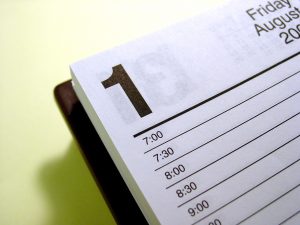Life in the 21st century is anything but simple. Our world feeds us countless messages defining what we need in order to be happy, successful, and fulfilled. We’ve all heard these messages, either directly or indirectly, and we’ve all bought into at least some of the hopeful promises that our lives can improve…if only we [you fill in the blank].
But the true result of our modern life, trying to keep up with our packed schedules, overflowing to-do lists, and material abundance is sadly, not satisfaction and peace. Rather, we have stress, anxiety, broken relationships, and a LOT of stuff.
So, in the complexity of our technological age, what does it mean to simplify? What does a simpler life look like for an ordinary family keeping up with work, school, and countless demands? Regardless of the season of life—a young couple, family with children, or empty nesters—how can any of us find a greater level of simplicity in our noisy, chaotic, energetic world?
The beautiful truth is that the concept of “living simply” looks different for each person and every family. What I deem a simpler, less complicated life for my family will undoubtedly look different from your ideal. The challenge is that it takes effort to figure out how to step out of a cluttered and demanding lifestyle to pursue a more balanced and satisfying experience of daily life.
I want to highlight the two qualities that define a simpler life, according to Deborah DeFord in her book, The Simpler Life (The Readers Digest Association, Inc, 1998). These are integrity and intentionality.
Integrity is defined as a state of being whole and undivided. This ideal means I need to look at what is important to me, and then live according to those goals and values. If I believe physical fitness is important but never make time in my week to get up and move, then I am not living an integrated life. Rather, to live according to what I value, I will commit to walking 3 times each week and schedule it on my calendar. It’s as simple as that: Live in accordance with what is important to you.
Intentionality means we act with purpose. We consciously decide the choices we make throughout our day. Thus, to be intentional requires a certain mindfulness. If we are always “going with the flow,” we may feel spontaneous, but we are not in control of our day. We are reacting rather than being proactive. I must admit that I sometimes fell prey to impulse purchases, buying things because they were on sale, even though they were not items on my list. The result was I spent money I hadn’t planned to spend, brought home things I might not actually use, and then had to find a place to store my latest bargains. Learning to live with intention means pausing to evaluate my true needs.
How will pursuing integrity and intentionality help you lead a simpler life?
Only you can decide what is most important to you. Only you can be in control of the way you spend your time, the things you buy, and the relationships you pursue. When you proactively make decisions on what you need in your life and shut out the noise of what others are proclaiming, you will have the ability to pursue only those people, activities and things that give meaning to your life. Saying “no” to the unnecessary is saying “yes” to what is most valuable—which leads to true satisfaction, contentment, and peace.
 Is the morning of the first day of school a frenetic, crazy time at your house? How about the next few days? Whether your child is elementary- or high-school bound, it’s hard to get her up and moving in the morning and to bed at a reasonable time. Once she’s awake, then comes figuring out what to wear, a frantic search for the missing shoe because another pair isn’t acceptable, followed by general chaos that causes wasted time, drama and stress!
Is the morning of the first day of school a frenetic, crazy time at your house? How about the next few days? Whether your child is elementary- or high-school bound, it’s hard to get her up and moving in the morning and to bed at a reasonable time. Once she’s awake, then comes figuring out what to wear, a frantic search for the missing shoe because another pair isn’t acceptable, followed by general chaos that causes wasted time, drama and stress!
It doesn’t have to be this way. With some simple planning and organization, things can run smoothly. Whether your child is starting school for the first time or a returning student, these tips will ease the transition from summer to school.
Being organized makes life so much easier. As one of my favorite clients said upon completing his project, “Peace through organization.”
 Sometimes the simplest things make a huge difference. We spend a lot of time on computers, and if we could do what we needed to do faster, there would be more time to do the things we want to do. Here are my top Google short-cuts that help me save time.
Sometimes the simplest things make a huge difference. We spend a lot of time on computers, and if we could do what we needed to do faster, there would be more time to do the things we want to do. Here are my top Google short-cuts that help me save time.
1. Google is a great spell check
Don’t know how to spell a word? Type in the word using your closest guess. As long as your guess is reasonably close, Google returns the correct spelling.
2. Google searches on images
When looking for a product, type in the product description and select “images” for your search tool (gray options across the top.)
3. Google is a dictionary
Need a definition? You don’t need to go to a dictionary website. Type in “define” and the word and google give the definition.
4. Google understands date ranges
To identify a range of years, use two periods. I use it often to get the most current technology results. (iPhone updates 2016..2017)
5. Google is a calculator
Type in an equation and Google gives you the result and displays a calculator for additional calculations.
6. Google gives the weather forecast
Type in the zip code and the word weather and you get a 10-day forecast. (weather 08003)
7. Google answers questions
Type in the question and results yield the answer. (When does daylight savings time end?)
8. And my personal FAVORITE – Google is a fabulous timer
Let your computer alert you after a certain amount of time? Type in “timer” and the length of time, and a countdown timer dings when you are out of time. (Timer 10 minutes)
 Some of us love change. With each new month we tend to change our clothing, eat different foods and decorate our homes. That’s a lot of work for some of us. How do you remember everything that needs to be done? I use my calendar. Each month reminds me of what needs to be done. Below is a monthly glance at my calendar.
Some of us love change. With each new month we tend to change our clothing, eat different foods and decorate our homes. That’s a lot of work for some of us. How do you remember everything that needs to be done? I use my calendar. Each month reminds me of what needs to be done. Below is a monthly glance at my calendar.
How do you remember?
An easy way to keep up with the changing seasons is to set an event in your calendar for each month and have it notify you. Or, maybe break up things into weekends, starting each Saturday morning with a “things to do list.” I pretty much have it memorized and enjoy the changes that the seasons bring.
Happy autumn to you!
Click on the title above to learn more about the featured author.
 Do you struggle trying to accomplish everything you want to get done in a week? Are you always asking yourself “where does the time go?” Are you always running late for appointments? Instead of trying to keep it all organized in your head, start a time management system for yourself by using a calendar (digital or paper, whatever your preference), a Day-Timer, or even an excel spreadsheet will work.
Do you struggle trying to accomplish everything you want to get done in a week? Are you always asking yourself “where does the time go?” Are you always running late for appointments? Instead of trying to keep it all organized in your head, start a time management system for yourself by using a calendar (digital or paper, whatever your preference), a Day-Timer, or even an excel spreadsheet will work.
Remember school schedules? The week is scheduled by the day, classes with start and end times are filled in first and the remaining time is what you have left for the week. Start with your non-flexible commitments, such as; work, and then plan the other activities or tasks by the days and times available in the space you have left. Block out the amount of time each commitment, task, or activity will take and include travel time if necessary. This will visually put your time available to accomplish your tasks for the week “at a glance” and into perspective. This is imperative for getting a handle on your time management schedule. If there are overlapping commitments and a shortage of time available to get everything accomplished, you know it’s time to reorganize your week.
Keep in mind, you do need to sleep, so only schedule your time during your realistic waking hours. Each day follow your day’s schedule of events to know where you have to be and when. Then when emergencies crop up and they will, you will have a much better handle on where to reschedule the lessor priorities.
Don’t overbook yourself. Be realistic, allow for travel time and most importantly, don’t forget to allow for “down-time”!
Click on the title above to learn more about the featured author.
 The first day of Fall is September 22. Work and school are back in full swing. Managing your to-dos effectively is essential to maximizing your productivity at home and work.
The first day of Fall is September 22. Work and school are back in full swing. Managing your to-dos effectively is essential to maximizing your productivity at home and work.
A while ago I gave a presentation called “Stop Mumbling, Oops, I Forgot: How to Effectively Manage Your To-Dos.” With good intentions, people say they’ll do something but then forget because it wasn’t noted somewhere. People waiting for the promised ‘something’ to be done are disappointed. At work, this is a particularly bad practice. A good practice is to make notes on your to-do list or calendar so tasks are not forgotten.
Even with the best systems, life sometimes gets in the way. As John Lennon said, “Life is what happens to you while you’re busy making other plans.”
Case in point: I received an email from an attendee the next day. “My kids need completely different school supplies than what we bought, my husband suddenly needs to take his car into the shop, mom’s aide left early without doing the grocery shopping, and I have a report deadline at work tomorrow. How do I know what to do first?” Let’s call her Amy and her husband Michael.
I made these assumptions: The report will take Amy’s available time to complete, and Amy and Michael each need a car to get to work.
Following was my response.
First, Amy should complete the report and meet the deadline. Her job provides needed income and benefits, so she shouldn’t potentially put it at risk.
Second is Michael’s car. There are a few options. Have Michael find out if the auto shop provides a loaner car, ask someone to drive him from the shop to work (if convenient), call Uber/Lyft or wait for the car to be repaired.
Third comes food. Cereal, eggs and PB&J (or whatever is on hand) can fill bellies for a day. Other options include ordering food from a market with home delivery, ordering takeout with delivery, and asking the aide to get groceries the next time he/she’s on duty.
School supplies are fourth. Amy can order the supplies online with next-day delivery or pickup after work.
______________________________________________________________
General takeaway tips:
• Have the school provide in advance a list of needed supplies and buy them then.
• Schedule non-cancelable appointments with yourself to work on and complete reports and other important work well before the deadline to avoid a last-minute crises.
• Develop a Plan B to get to work in case of future car trouble or other emergency.
• Join AAA or another roadside-assistance plan.
• Keep the fridge and pantry stocked with essentials such as cereal, milk, bread, eggs, pasta, tuna, soup and frozen meals.
Having a contingency plan for emergency situations helps to make life less stressful. Who wouldn’t want a little less stress?
When life overwhelms you, stop and take a deep breath. Figure out what needs to be done and by when. Prioritize by most-to-least important. So, first do what needs immediate attention. If you find crisis situations happen too often, click HERE to contact a member of the Greater Philadelphia Chapter of the National Association of Professional Organizers for help.
Click on the title above to learn more about the featured author.